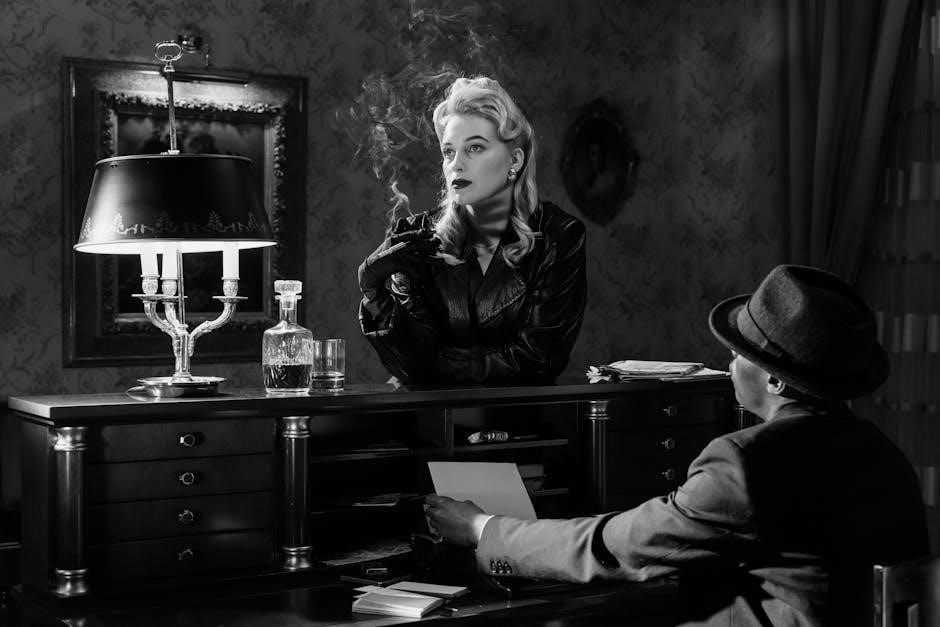This PDF provides a comprehensive guide to understanding the film Glory‚ offering discussion questions and answers that explore its historical context‚ themes‚ and cultural significance.
Overview of the Movie Glory

Glory is a historical drama film directed by Edward Zwick‚ released in 1989. It tells the story of the 54th Massachusetts Infantry‚ the first all-Black regiment in the Civil War. The movie follows Colonel Robert Gould Shaw‚ portrayed by Matthew Broderick‚ as he leads his soldiers through training‚ battles‚ and the eventual assault on Fort Wagner. The film highlights themes of racial equality‚ sacrifice‚ and heroism‚ featuring powerful performances by Denzel Washington and Morgan Freeman. It captures the struggles and triumphs of the regiment‚ offering a poignant portrayal of their legacy.
Significance of the 54th Massachusetts Infantry
The 54th Massachusetts Infantry holds profound historical significance as the first all-Black regiment in the Civil War. Formed in 1863‚ it symbolized a turning point in the fight for racial equality‚ proving African-Americans’ determination to contribute to the Union’s cause. Their courage‚ particularly during the assault on Fort Wagner‚ showcased their resilience and sacrifice. The regiment’s existence challenged stereotypes and paved the way for future generations‚ embodying the broader struggle for freedom and equality during the Civil War era.
Purpose of the Questions and Answers PDF
The Glory Movie Questions and Answers PDF is designed to enhance understanding and engagement with the film. It provides structured discussion questions that prompt critical thinking about key themes‚ historical accuracy‚ and character development. These questions help students reflect on the movie’s significance‚ encouraging deeper analysis of its portrayal of the 54th Massachusetts Infantry and its role in the Civil War. The PDF serves as an educational tool‚ fostering meaningful dialogue and enriching the learning experience for viewers of all ages.
Historical Accuracy in the Movie Glory
The film Glory accurately portrays the bravery of the 54th Massachusetts Infantry and the assault on Fort Wagner‚ blending historical facts with cinematic storytelling to honor real events.
The Real Story of the 54th Regiment

The 54th Massachusetts Infantry‚ led by Colonel Robert Gould Shaw‚ was the first African-American regiment in the Civil War. Formed in 1863‚ it symbolized the fight for racial equality. The regiment’s bravery during the assault on Fort Wagner‚ despite heavy losses‚ showcased their determination; Historical records reveal the challenges they faced‚ including discrimination and unequal pay. Their legacy continues to inspire‚ highlighting the struggle for freedom and justice during the Civil War era.
Accuracy of Key Events Depicted in the Film
The film Glory accurately portrays the formation and heroism of the 54th Massachusetts Infantry‚ though some artistic liberties were taken. The assault on Fort Wagner is depicted realistically‚ capturing the regiment’s bravery despite overwhelming odds. The training sequences and the soldiers’ determination align with historical records. However‚ the timeline of events and some character interactions were condensed or dramatized for cinematic effect. The film remains faithful to the spirit of the 54th Regiment’s sacrifice and their pivotal role in the Civil War.
Historical Figures and Their Roles
Colonel Robert Gould Shaw‚ a white Union officer‚ led the 54th Massachusetts Infantry‚ the first African-American regiment in the Civil War. Frederick Douglass‚ a prominent abolitionist‚ influenced recruitment by advocating for Black soldiers’ dignity. His role emphasized the fight for racial equality and freedom. These figures played pivotal roles in shaping the regiment’s legacy and the broader struggle for justice during the Civil War‚ as depicted in the film and discussed in the PDF.

Key Characters and Their Roles
The film Glory highlights the bravery and sacrifice of Colonel Robert Gould Shaw‚ Private Silas Trip‚ and Frederick Douglass‚ whose roles shaped the 54th Regiment’s legacy.
Colonel Robert Gould Shaw
Colonel Robert Gould Shaw was the white commander of the 54th Massachusetts Infantry‚ the first all-black regiment in the Civil War. His leadership and dedication were pivotal in the regiment’s journey. Shaw’s decision to refuse his pay until his soldiers received equal wages showcased his commitment to racial equality and fairness. His relationship with the soldiers‚ particularly Private Silas Trip‚ highlighted his growth from a privileged upbringing to a compassionate leader.
Shaw’s ultimate sacrifice at Fort Wagner became a symbol of the struggle for freedom and equality. His character exemplified courage and the belief in a unified cause‚ inspiring both his soldiers and the audience.
Private Silas Trip
Private Silas Trip‚ portrayed in the film‚ was a former slave who joined the 54th Massachusetts Infantry. His character represented the resilience and determination of African-American soldiers. Trip’s journey from enslavement to becoming a soldier highlighted the broader struggle for freedom and equality. His interactions with Colonel Shaw and other soldiers showcased personal growth and the challenges of overcoming racial barriers. Trip’s story symbolized the sacrifices made by many during the Civil War‚ emphasizing the human cost of fighting for liberation.
Frederick Douglass and His Influence
Frederick Douglass‚ a prominent abolitionist‚ played a pivotal role in advocating for African-American enlistment in the Union Army. His influence extended to encouraging Black soldiers to join the 54th Massachusetts Infantry‚ emphasizing the importance of their participation in the fight for freedom. Douglass’s activism not only inspired enlistment but also highlighted the significance of African-American contributions to the Civil War. His legacy in the film underscores the broader struggle for racial equality and the enduring impact of his advocacy during and beyond the war.

Themes and Symbolism in Glory
The film explores themes of racial equality‚ sacrifice‚ and heroism‚ with symbols like Fort Wagner representing the struggle for freedom and justice during the Civil War.
The Struggle for Racial Equality
The film vividly portrays the fight for racial equality through the 54th Massachusetts Infantry‚ highlighting the obstacles faced by African-American soldiers. Their courage challenges societal norms and discrimination‚ emphasizing the importance of dignity and equality. Key scenes‚ such as their refusal to accept unequal pay‚ underscore the broader struggle for civil rights. The movie illustrates how their sacrifices contributed to the abolition of slavery and the pursuit of freedom‚ leaving a lasting impact on American history.
Sacrifice and Heroism

The film showcases profound acts of sacrifice and heroism‚ particularly through the bravery of the 54th Massachusetts Infantry. Colonel Robert Gould Shaw and Private Silas Trip embody these themes‚ as they risk their lives for a greater cause. The climactic assault on Fort Wagner highlights the ultimate sacrifice‚ emphasizing the cost of freedom and equality. Their heroism not only inspired hope but also paved the way for future civil rights advancements‚ leaving a lasting legacy in American history.
The Significance of Fort Wagner
Fort Wagner was a crucial Confederate stronghold protecting Charleston Harbor‚ making it a strategic target for the Union. The 54th Massachusetts Infantry’s assault‚ though unsuccessful‚ symbolized courage and determination. This event highlighted the harsh realities of war and the significant role African-American soldiers played in the fight for freedom. The attack underscored the importance of unity and sacrifice in the pursuit of equality‚ leaving a lasting impact on the Civil War and civil rights.
Discussion Questions from the PDF
The PDF includes thought-provoking questions about the film’s perspective‚ historical accuracy‚ and themes. It encourages reflection on Colonel Shaw’s leadership‚ the role of Black abolitionists‚ and the emotional impact of the movie’s ending.
Why the Film is Told Through Colonel Shaw’s Perspective
The film is told through Colonel Robert Gould Shaw’s perspective to highlight his transformation from a privileged white officer to a passionate advocate for racial equality. By focusing on Shaw‚ the movie bridges the gap between white and Black experiences during the Civil War‚ allowing audiences to connect with the struggles of the 54th Massachusetts Infantry through his leadership and personal growth. This narrative choice emphasizes the unity and sacrifice that defined their shared fight for freedom.
The Role of Black Abolitionists

Black abolitionists played a crucial role in the film and historical context by advocating for the enlistment of African-American soldiers. Frederick Douglass‚ a prominent figure‚ encouraged Black men to join the Union Army‚ believing it would earn them dignity and pave the way for freedom. Their efforts not only supported the war effort but also challenged racial prejudices‚ inspiring unity and hope among African-Americans during the Civil War era.

Colonel Shaw’s Decision to Refuse His Pay
Colonel Robert Gould Shaw’s decision to refuse his pay was a symbolic act of solidarity with his African-American soldiers‚ who received lower wages than white soldiers. This gesture highlighted the racial inequalities prevalent during the Civil War and demonstrated Shaw’s commitment to justice and equality. His refusal underscored the broader struggle for fairness and dignity‚ aligning with the ideals of Black abolitionists like Frederick Douglass‚ who advocated for equal treatment of African-American soldiers.

Impact and Legacy of the Movie
Glory has significantly influenced Civil War education‚ offering a poignant portrayal of the 54th Regiment’s bravery. Its cultural impact continues to inspire‚ preserving history and promoting racial equality awareness.
Glory’s Contribution to Civil War Education
The movie Glory has become a vital educational tool‚ offering insights into the Civil War and the 54th Massachusetts Infantry’s historic role. It vividly portrays the struggles and bravery of African-American soldiers‚ making history accessible to students. The film‚ combined with discussion questions‚ helps educators teach themes like racial equality and sacrifice. By depicting real events‚ Glory enhances understanding of the Civil War’s complexities‚ inspiring further exploration of this pivotal era in American history.
Reception and Awards
Glory received widespread critical acclaim and won several prestigious awards‚ including Academy Awards. The film’s historical accuracy and emotional depth resonated with audiences‚ making it a landmark in cinematic storytelling. Its success highlighted the importance of portraying underrepresented histories‚ earning it a lasting place in both education and entertainment. The movie’s impact continues to inspire discussions and reflections on racial equality and sacrifice‚ solidifying its legacy as a powerful educational resource.
Cultural Significance
Glory holds profound cultural significance by shedding light on the bravery and sacrifices of African-American soldiers during the Civil War. The film not only educated audiences about the 54th Massachusetts Infantry but also sparked conversations about racial inequality and heroism. Its portrayal of historically overlooked figures has made it a vital educational tool‚ preserving their legacy for future generations and emphasizing the importance of diverse representation in storytelling.
The Glory Questions and Answers PDF serves as an invaluable resource for understanding the film’s historical and emotional depth‚ fostering meaningful discussions and reflections on its enduring legacy.
Reflections on the Movie’s Ending
The ending of Glory leaves a profound emotional impact‚ emphasizing the ultimate sacrifice of the 54th Regiment at Fort Wagner. The final scenes underscore the bravery and resilience of the soldiers‚ highlighting the cost of their fight for freedom and equality. The movie concludes with a sense of dignity and purpose‚ reminding viewers of the enduring legacy of these heroes. The emotional resonance of the ending encourages reflection on the sacrifices made during the Civil War and their significance in shaping history.
Overall Impressions of the Film
Glory is a powerful and emotionally stirring film that captures the courage and resilience of the 54th Massachusetts Infantry. The movie’s strong performances‚ coupled with its historical significance‚ create a compelling narrative that highlights the struggles and triumphs of African-American soldiers during the Civil War. The film’s attention to detail and emotional depth leave a lasting impression‚ making it a memorable and impactful cinematic experience. It successfully balances action with poignant storytelling‚ ensuring its message of equality and sacrifice resonates deeply with audiences.
The Importance of Historical Movies
Historical films like Glory play a vital role in educating audiences about pivotal moments in history; They capture the essence of real events‚ making them relatable and engaging for modern viewers. By portraying the bravery of the 54th Massachusetts Infantry‚ Glory highlights the struggles of African-American soldiers during the Civil War. Such movies not only preserve history but also foster empathy and understanding. They serve as a bridge between the past and present‚ ensuring that important stories are remembered and appreciated by future generations. Films like Glory remind us of the power of sacrifice and resilience.
